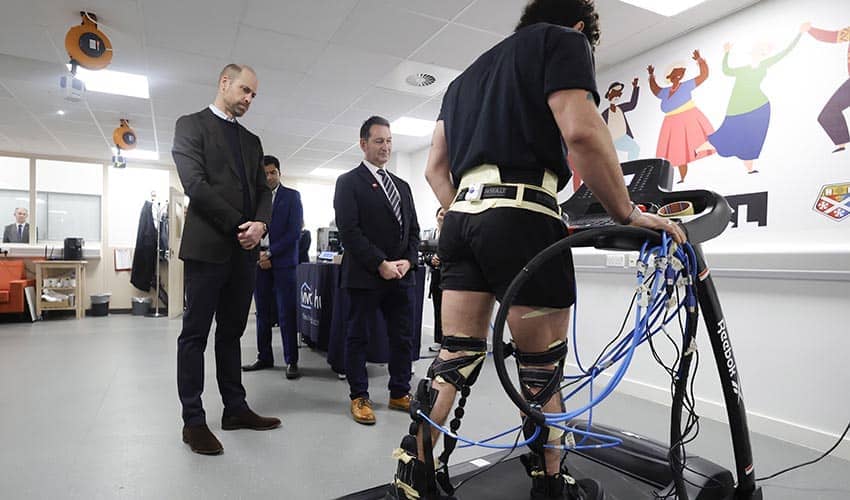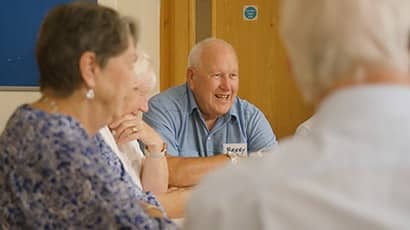Statement on Case Review into Student Deaths by Suicide from January 2010 to July 2018

UWE Bristol is announcing today the findings of a Case Review into Student Deaths by Suicide between January 2010 and July 2018, supported by Public Health England (PHE) and local public health experts.
UWE Bristol is announcing these findings as part of our commitment to a progressive and open approach to student mental health and wellbeing, and to provide an example of a model that can be used by other universities, colleges and schools across the UK.
As an institution with over 30,000 students, death by suicide is thankfully a very rare occurrence at UWE Bristol. However, any number of suicides is too many and we want to ensure that we are doing everything possible to prevent further tragedies occurring among our student population. We wanted to use this report to improve our preventative interventions already in place and inform the content of our suicide prevention plan, as part of our long-term commitment to addressing student mental health.
Cases of probable suicide among our students over the past eight years (1 January 2010 to 31 July 2018) were identified using a range of data sources, including university records that recorded the deaths of students but not the causes, along with academic, accommodation and finance records, and coroner's investigation and verdict records. The data sources also included the notes and memories of UWE Bristol staff.
The report was then used to identify any common factors between the cases and lessons learnt for policy and practice. The analysis involved comparing the demographics and broader information about the students in the study with the UWE Bristol student body as a whole. The report was co-produced with input from national experts in suicide prevention and local public health professionals. PHE contributed resources and support as part of its role in supporting the cross-governmental strategy for suicide prevention, which involves creating resources for local authorities and healthcare professionals to better understand and prevent suicide.
The report collated and analysed a range of data for 14 identified probable deaths by suicide (confirmed, suspected or likely) among UWE Bristol students. This figure was later revised to 12 probable deaths by suicide during the period examined, from over 200,000 students enrolled at UWE Bristol over that period.
It is important to note that the sample size was very small for drawing meaningful conclusions. However, the report included the following findings:
- Half of the deaths were concentrated in the months between January and April in each year that was covered by the report.
- This finding reflects Office for National Statistics (ONS) data on student suicide, and that the early part of the year is a focus of concern nationally.
- More than half of students had resat exams or submitted extenuating circumstances forms, while one in four had requested a course transfer.
- Just under half of the students had faced financial difficulty.
- Only three of the students in the case group had formally self-identified as having mental health difficulties on their university entrance forms but at least six had been known to specialist mental health services at some point in their lives.
- The proportion of students aged 21 and over in the case group was higher than in UWE Bristol's student population as a whole.
- The report showed that no clusters of suicide occurred within the period of study, and there was no evidence of previously undetected or unknown links between the cases.
The report was designed to shape the development of the University's suicide prevention plan and ongoing mental health support services. As a result of the findings from the report, UWE Bristol has already implemented the following:
- Developing a new suicide prevention and response plan, which aims to create an environment that supports the development of life skills and emotional resilience,
- encouraging students to seek help as soon as they need it and not just at crisis point, and better identifying and responding to vulnerable or at-risk students.
- The creation of student-led, alcohol-free student spaces on our campuses, including the opening of the new 24-hour Student Centre on our Frenchay campus earlier this year.
- Developing additional awareness campaigns among students, parents and carers to promote disclosure of mental health concerns at the application/joining stage, to ensure support can be in place as soon as they join the University.
- Greater engagement with parents and carers, including a new newsletter, dedicated section on our website and direct telephone line for concerned families.
- In partnership with the University of Bristol, we are leading ongoing conversations with the NHS, GPs and local authorities to ensure better communication and data-sharing, and more joined-up students' wellbeing support.
- We have introduced a learner analytics system focused on enabling staff to support students' mental health and wellbeing. The system flags up when a student's level of academic engagement is lower than expected, allowing us to reach out to offer additional support. Since we began piloting this technology last September, 50 per cent of students identified by the software have taken up the offer of extra help.
Like all universities, schools and colleges, we are deeply concerned by the increase of mental health issues amongst our young people nationally, and we recognise that what is happening at UWE Bristol reflects a wider, worrying trend that poses a huge challenge to all of us.
We hope that the report and methodology can be used by other universities, schools and colleges, and that it can form part of a collaborative effort to ensure we are providing the best possible support to students and young people across the UK.
Please be mindful that the contents of this report and the way it is communicated will have an impact on the families and loved ones directly affected, and potentially our wider student community and young people suffering with their own mental health. We therefore request that the information contained within the report is treated with sensitivity and respect.
-ENDS-
For more information, please contact pressoffice@uwe.ac.uk - Please note, we can only respond to media requests.
What was the purpose of the student deaths by suicide case review?
To improve our preventative interventions already in place and inform the content of our new suicide prevention plan. The process of conducting the review aligns with our long-term commitment to addressing student mental health as part of our progressive, holistic and sector-leading approach to the issue. This is a very complex issue and we are committed to increasing our understanding and knowledge, to ensure that we are doing everything we can to support students and prevent further suicides.
How did it come about?
In June 2018 UWE Bristol was approached to take part in a piece of work, reviewing the cases of suicides in university students from 2010 to 2018. We agreed to take part in the research and the case review, facilitated by Public Health England (PHE) and conducted by an independent local public health expert between July 2018 and September 2018.
How was the review carried out and who was involved?
Cases of probable suicide among UWE Bristol students over the past eight years (1 Jan, 2010 - 31 July, 2018) were identified using a range of data sources, including university records that recorded the deaths of students but not the causes, along with academic, accommodation and finance records, and coroner's investigation and verdict records. The data sources also included the notes and memories of UWE Bristol staff.
The report was then used to identify any common factors between the cases and lessons learnt for policy and practice. The analysis involved comparing the demographics and broader information about the students in the study with the UWE Bristol student body as a whole.
The methodology used was co-produced with input from national experts in suicide prevention, local public health professionals and PHE.
What were the findings?
The review collated and analysed a broad range of data for 14 identified probable deaths by suicide (confirmed, suspected or likely) among UWE Bristol students, out of a total university population over this period of more than 200,000. This figure was later revised to 12 probable deaths by suicide during the period examined.
Although we have to be mindful that the sample size was very small for drawing meaningful conclusions, the findings included:
- Half of the deaths were concentrated in the months between January and April. This finding reflects national ONS data on student suicide. The early part of the year is a focus of concern nationally.
- More than half of students had resat exams or submitted extenuating circumstances forms, while one in four had requested a course transfer.
- Just under half of the students had faced financial difficulty.
- Only three of the students in the case group had formally self-identified as having mental health difficulties on their university entrance forms but at least six had been known to specialist mental health services at some point in their lives.
- The proportion of students aged 21 and over in the case group was higher than in UWE Bristol's student population as a whole.
What does the University plan to do with the results?
The review has generated new evidence and insights into common features, and lessons learnt from the deaths, to help inform and shape the development of our suicide prevention plan. We plan to share the report methodology and learnings with universities and the wider HE sector, colleges and schools, the NHS and third sector partners.
Related news

13 February 2026
New round of Scale up 4 Growth funding opens for SMEs
UWE Bristol has launched the next round of Scale up 4 Growth grant funding, designed to accelerate the growth of SMEs across the region.

10 February 2026
Work by UWE Bristol lecturer features in Government’s National Cancer Plan
Work by a UWE Bristol academic has been included in the Government’s National Cancer Plan.

05 February 2026
Spike Print Fair launches in partnership with UWE Bristol
Printmakers working across all techniques and formats are invited to apply to exhibit at a new three-day printmaking fair at Spike Island from 24 – 26 July.

30 January 2026
Standing together against hate – A joint message from UWE Bristol, UCU, UNISON, Unite, and The Students’ Union at UWE Bristol
Reiterating our commitment to supporting our staff and students.

27 January 2026
Graduate completes 52 marathons in a year for charity after mental health challenges
A UWE Bristol graduate who had mental health difficulties during his studies has raised £9,000 for charities by completing 52 marathons in one year.

27 January 2026
From scraps to soil: the UWE Bristol alum transforming campus food waste into fertile compost to feed university garden
A UWE Bristol alum has gone back to his roots to transform food waste from his former university into living, nutrient-rich compost to feed back into its student and staff-run Community Garden.

23 January 2026
On-demand minibus services beneficial in rural areas but face financial challenges, trials suggest
Trials of ‘demand responsive transport’ minibus services boosted connectivity for people in rural and suburban areas, according to a new report produced by UWE Bristol researchers.

22 January 2026
Prince of Wales visits UWE Bristol to see pioneering robotic tech tackling societal health challenges
The Prince of Wales visited the Bristol Robotics Laboratory (BRL) at the University of the West of England’s (UWE Bristol) Frenchay campus today (22 January 2026) to learn about the pioneering robotic technologies being developed to help the ageing and disabled population maintain mental and physical wellbeing and remain independent for longer.

21 January 2026
Dementia support groups developed by professor adopted across globe
A programme started by a UWE Bristol academic to provide emotional and practical support for people with dementia is now being adopted around the world.

20 January 2026
UWE Bristol becomes South West Regional Hub lead for national Climate Ambassadors scheme
UWE Bristol is the new regional hub lead for the Climate Ambassadors scheme, a national initiative helping to drive the development of climate action plans in education settings across England.

19 January 2026
UWE Bristol academic to help shape new national Art and Design curriculum for England
A UWE Bristol academic has been appointed by the Department for Education to draft a new national curriculum for Art and Design.

18 December 2025
UWE Bristol professor appointed National Institute for Health and Care Excellence CEO
Jonathan Benger CBE, Professor of Emergency Care at UWE Bristol, has been appointed as the new chief executive officer of the National Institute for Health and Care Excellence (NICE).






